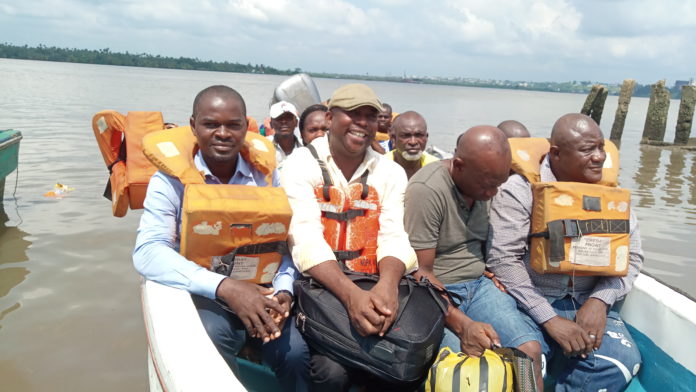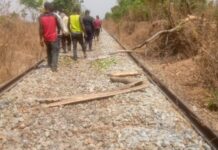Abasifreke Effiong (left) with other passengers onboard a speedboat in Oron.
By Abasifreke Effiong
The preference of commuters travelling from Uyo, the capital of Akwa Ibom state to Calabar in Cross River state, had over time been land transportation; but now many people who wish to travel on this one-way-in and one-way-out Uyo -Itu – Calabar road get hazy in a conflict of choice – whether to travel on land or sea. The dilapidated Calabar – Itu road has made travelling from Akwa Ibom to Cross River much of a nightmare – stressful, overwhelming, exasperating and dangerous.
The dilapidated road is gradually severing the ease of physical contact and social communion the people of Akwa Ibom and Cross River once enjoyed. In November last year, the Obong of Calabar, who is the highest traditional title holder in Cross River state and his council missed the very important maiden town hall meeting of South-South Monarchs’ Forum, in Uyo, which had the Secretary to the Government of the Federal (SGF) Mr. Boss Mustapha as guest. At the event, the Oku Ibom Ibibio, who is the President General of the Ibibio traditional rulers and chairman of the Akwa Ibom state council of chiefs, His Eminence, Ntenyin Solomon Etuk, noted with regrets the absence of the Obong of Calabar.
He said, “it is a pity that the Obong of Calabar and other monarchs from Cross River state are unable to make it to this summit due to the current state of the Calabar-Itu road. The people of Akwa Ibom and Cross River are one and share a strong bond. Unfortunately, the near total collapse of the Calabar-Itu road has threatened us in a very serious way.”
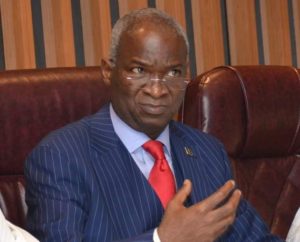 Minister of Works and Housing, Mr. Babatunde Fashola.
Minister of Works and Housing, Mr. Babatunde Fashola.
The story of the dilapidated Calabar-Itu road has been told at different fora to the federal government. At different fora too, since 2017, the federal government has given assurances that the road will be fixed. Sadly, the road gets worse by the day.
Think about how frustrating, threatening and dangerous it is being locked down in a bad-road-induced hold-up for eight to 10 hours in a journey that should ordinarily take an hour 20 minutes. This is the odd reality the federal government’s neglect of the Calabar- Odukpani- Itu- Ikot Ekpene road has thrown at the people of Akwa Ibom and Cross River states.
 Passengers stranded on the Calabar -Itu road trekking out from a suffocating hold-up.
Passengers stranded on the Calabar -Itu road trekking out from a suffocating hold-up.
In the last six months, an estimated 4,800 commuters spend at least six hours travelling from Uyo to Calabar, a distance of about 28.2km. Six hours is the duration a commuter needs to travel from Uyo to Warri in Delta state, a distance of about 280kms. At weekends, when there is more heavy duty trucks on the road, commuters spend more than ten hours on the road. There were days in July, August, September and October when commuters passed the night on the Calabar – Itu road.
In one weekend in August, some commuters spend more than 24 hours on the Calabar-Odukpani-Itu road, yet could not get to Uyo, their destination.
 Commuters stranded in a hold-up on the Calabar-Itu road.
Commuters stranded in a hold-up on the Calabar-Itu road.
“I spent two days on the road. When it was impossible to go further, I turned back to Calabar and used a boat and in 30 minutes I got home”, Etim Ntekim said.
“The deplorable state of the Calabar-Itu road is now a national disaster and disgrace. The nonchalant attitude of the federal government to this road is worrisome and annoying”, Daniel Edon, an indigene of Akwa Ibom said.
On Wednesday 27th November, two students who needed to travel to Abuja in an early morning flight on the 28th through the Victor Attah Int’l airport in Akwa Ibom state told The Dune on arrival at Itam central motor park in Akwa Ibom state that they left Calabar at about 11a.m and arrived the park in Uyo at 5:14p.m.
Aircraft passengers from Cross River who have morning flights to catch in Uyo, now face the burden of leaving Calabar a day to their flight schedule.
“I had to leave Calabar, get to Uyo and lodge here even though my flight is by 10a.m tomorrow. Because if I leave Calabar by 6a.m, I won’t get to Uyo by 10a.m. to catch my flight”, an air passenger who did not want his name on print told The Dune.
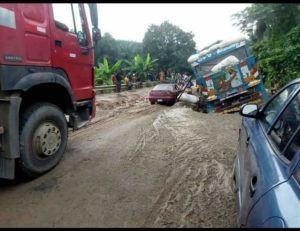 The state of Calabar- Itu road when there is free flow of traffic.
The state of Calabar- Itu road when there is free flow of traffic.
The prices of staple food produced in Cross River have gone up phenomenally in Akwa Ibom due to increase in fares. Transporters plying the Calabar – Itu route have increased their fare by N500 to N600. For instance, the Akwa Ibom Transport Company (AKTC) has raised its fare from N1000 to N1500 for Non-AC buses and, and N1200 to N1700 for air conditioned buses. The price of granite has gone up by N20,000 in Uyo. A-30 tonne of granite from Akamkpa which use to be sold for N175,000 and N180,000 in Uyo,now goes for N200,000 and N205,000. A stone merchant in Uyo, Samuel Michael said truck drivers now charge N20,000 higher per 30 tonne than they used to charge.
“From N60,000 and N65,000, we are now paying N85,000 to N90,000 to hire a truck. The trucks can’t get to Uyo in a day again because of the bad road and hold-up.” The cost of hiring a-30 tonne truck is now higher than the cost of the granite at the quarry.
 Trucks and cars stuck in hold-up on the Calabar – Itu road.
Trucks and cars stuck in hold-up on the Calabar – Itu road.
▪ Promises by federal government without corresponding actions
Residents of Cross River and Akwa Ibom states waited expectantly on the federal government throughout December last year for some palliatives to be done on the road. No palliative was carried out despite the emphatic assurances given in November by the Senior Special Assistant to the President on Niger Delta Affairs, Senator Ita Enang.
Enang had during what was called a ‘coordinated assessment’ of the road by four federal government agencies – federal Ministry of Works and Housing, Niger Delta Development Commission, FERMA, and Federal Road Safety Commission – assured that there will be concerted intervention on the road in December under the federal ministry of works’ ’ember month programme’.
“The essence of this assessment is for us to join forces in terms of resources to provide intervention on this road. FERMA will take its part and the federal ministry of works will take its part”, Enang said.
Apart from these agencies, Julius Berger which was awarded contract for the dualisation of one of the three sections of the road was also expected to carry out interventions on the road during the yuletide, but it did not.
Nigerians who commute the road are not happy because the Buhari administration appears not to be showing sufficient commitment towards the road project as it promised. Commuters said they had expected the federal government to make good use of this dry season to fix the road. But, “the road has gotten bad, and worse than it was”, Senator Ita Enang, Senior Special Assistant on NDDC to President Muhammadu Buhari, noted regrettably in an interaction with News Agency of Nigeria on Saturday 14th December, during an unscheduled visit to the road. Will the Calabar-Itu road remain another failed promise by the APC led government?
 Senator Ita Enang, Senior Special Assistant to the President on Niger Delta Affairs, speaking to journalists during an interagency inspection of Calabar -Itu road in November 2019.
Senator Ita Enang, Senior Special Assistant to the President on Niger Delta Affairs, speaking to journalists during an interagency inspection of Calabar -Itu road in November 2019.
The federal government in 2017 promised to commence the dualisation of the road. Senator Ita Enang, who was then the Senior Special Assistant on National Assembly Matters (Senate) to President Muhammadu Buhari, broke the cherry news on a private radio programme in Uyo, Akwa Ibom state in the last quarter of 2017, that the dualisation of Ikot Ekpene – Itu – Odukpani road with a spur to Ididep (Ita Enang’s community) was captured in the 2018 budget among major road projects earmarked for dualisation.
Unfortunately, throughout 2018 and 2019, the project did not start. During the 2019 electioneering, the PDP led government in Akwa Ibom and Cross River states used the federal government’s failure to start the road project as one of her campaign points against the APC and President Muhammadu Buhari. The presidency had then blamed her failure to start the project on the Bukola Saraki led senate which allegedly slashed proposal in the budget for the project.
The Calabar – Itu road project estimated to cost N54billion, has only gotten N9.1billion approved for it in three years’ budget. A paltry N1.1billion and N1billion was approved for the project in 2019 and 2020 budgets, in that order. It is disappointing that the three years’ approval for the project is not sufficient to mobilise Julius Berger to start work on the section of the road awarded to her. If the federal government keeps approving N1billion every year for the project, it will take 54 years to complete the three sections of the road. However, The Dune learnt that only two sections of the road are currently under consideration for dualisation; that is, the section already awarded to Julius Berger, and the Mbak Obio Itam – Ikot Ekpene section which is under procurement. The Odukpani (from the power plant) to Ayadehe section is yet to be considered.
 Comrade Success Jack (in front of the banner) leading a protest on the dilapidated Calabar – Itu road by Niger Delta Activist Forum.
Comrade Success Jack (in front of the banner) leading a protest on the dilapidated Calabar – Itu road by Niger Delta Activist Forum.
The desire of natives of Akwa Ibom and Cross River states to get the road fixed is endless. Individuals and groups in the two states have used different means of advocacy to draw federal government’s attention to the plight of commuters on the road. Between, Wednesday 11th to Monday 16th December, youths under the auspices of ‘Niger Delta Activist Forum’ led by Comrade Success Jack, held hundreds of commuters and vehicles hostage at the Odukpani end of the road, to vent their displeasure over how flippant the federal government was about the project. The group organised a six hours per day protest for five days to draw federal government’s attention to the bad state of the road. Their actions which enjoyed wide publicity on both mainstream and social media, reached a culmination when they met with the Minister of State for Works and Housing, Alhaji Mohammad Bukar, the MD/CEO of FERMA, Engr. Nurudeen Rafindadi and management of the federal Ministry of Works and Housing on 24th December.
 Executive of Niger Delta Activist Forum led by Comrade Success Jack in a group photograph with a delegation of the federal Ministry of Works and Housing which had Alhaji Abubakar Aliyu, Honorable Minister of State for Works and Housing; Alhaji Mohammad Bukar, Permanent Secretary, Works and Housing; Engr. Nurudeen Rafindadi, MD/CEO, FERMA and directors in the ministry, after a meeting in Abuja on Tuesday 24th December 2019.
Executive of Niger Delta Activist Forum led by Comrade Success Jack in a group photograph with a delegation of the federal Ministry of Works and Housing which had Alhaji Abubakar Aliyu, Honorable Minister of State for Works and Housing; Alhaji Mohammad Bukar, Permanent Secretary, Works and Housing; Engr. Nurudeen Rafindadi, MD/CEO, FERMA and directors in the ministry, after a meeting in Abuja on Tuesday 24th December 2019.
Seven days after that meeting, on 31st December 2019, FERMA started intervention on the Odukpani end of the road.
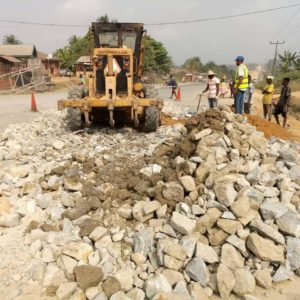 FERMA equipment carrying out intervention on the Odukpani end of Calabar – Itu road on Tuesday 31st December, 2019.
FERMA equipment carrying out intervention on the Odukpani end of Calabar – Itu road on Tuesday 31st December, 2019.
▪ Resort to maritime transportation
The dilapidated state of the Calabar-Itu road is inarguably affecting the economy, social life and security of the people of Akwa Ibom and Cross River. However, the situation has thrown up a broad opportunity for the two states to develop their long neglected maritime transportation sector. The Dune learnt that maritime transportation has not received any serious attention from the Akwa Ibom state government in the last one decade, except a passive mention in the budget and Governor Udom Emmanuel’s second term manifesto. In both Cross River and Akwa Ibom, private individuals are the ones pushing on to save the maritime transport sector from total neglect.
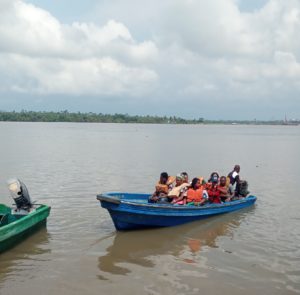 A speedboat with passengers leaving the jetty at Calabar.
A speedboat with passengers leaving the jetty at Calabar.
Even though commuters travelling from Uyo to Calabar through Oron by boat will have to spend more than they would have paid in a taxi, maritime transportation in this route is gathering more steam. It is more convenient and adventurous to travel by boat from Akwa Ibom to Cross River.
Some people who have phobia to travel by sea are getting around their fears at a first attempt. Most of them expressed strong desire to savour the experiences of the journey on boat again and repeatedly. The Dune editor and other first- timers on a boat from Oron to Calabar, and fro, in November 2019, share similar desire.
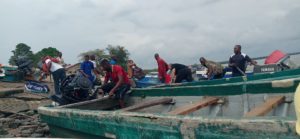 Passengers including a foreign national alighting from a boat at the Calabar jetty.
Passengers including a foreign national alighting from a boat at the Calabar jetty.
There is significant increase in the number of passengers travelling from Akwa Ibom to Cross River, and vice versa on boat, as more commuters continue to seek alternative means of the transportation between Uyo and Calabar, in a bid to escape the danger-prone Calabar – Itu road. About 210 to 280 passengers are ferried in small speedboats from Safe Journey Jetty, near marina resort, Calabar South, Cross River state to Oron, Akwa Ibom state, daily, manager of the floating jetty in Calabar said. The patronage was not as high as this when the Calabar -Itu was not dilapidated.
Editor of The Dune took a-two way boat ride from Oron to Calabar and Calabar to Oron on Wednesday 27th November 2019. He noted that it was more convenient, time-saving, adventurous and preferable to travel on a boat to Calabar despite the little differences in fare compared to road, and the manifest risks such as lack of proper documentation of passengers on the boat and strict enforcement of safety standards as well as the absolute non-regulation of the maritime transport system by government.
It takes 29 minutes to cruise from Oron to Calabar in a speed boat propelled by a 200hp (V8) engine. But in all, a commuter will need cumulatively, 2hrs 05minutes to travel from Uyo to Calabar. The commuter will spend 1hr 29minutes in a commercial taxi from Uyo to Oron; from Oron park, he or she will spend 3-5minutes on motorcycle to ‘Calabar beach’ in Oron as it is called, and 29 minutes on boat to Calabar. On the other hand, the fare is a bit higher on water than land. It cost N2,200 in all, from Uyo to Calabar. This is how the commuter will spend the fare: he/she will pay N600 from Uyo to Oron park, N100 on motorcycle to the beach and N1,500 from Oron to Calabar. However, the little difference in fare means absolutely nothing compared to the experience, the time saved, the convenience, peace, and adventure the commuter enjoys on boat.
[captan id=”attachment_1536″ align=”alignnone” width=”300″]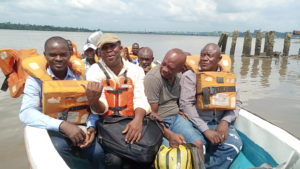 Editor of The Dune, Abasifreke Effiong (first from left) interacting with other passengers onboard a speedboat to Oron.
Editor of The Dune, Abasifreke Effiong (first from left) interacting with other passengers onboard a speedboat to Oron.
On daily basis, 16 – 20 boats ferry between 12 and 18 passengers each – depending on the size of the boat and capacity of the engine – across the sea. Speedboats leaving Calabar beach in Oron berth at the ‘floating jetty’ near marina resort in Calabar South. Information gleaned from the commissioning plague on a concrete statue erected at the jetty shows that the floating jetty was built in 1977 by a technical taskforce set up by Cross River state government with support from local artisans and was commissioned by Colonel Paul Ufuoma Omu, then military governor of Cross River. Though the jetty serves more than 200 people everyday from 7a.m – 5p.m,there is no government presence there aside a decrepit waiting hall and canteen constructed in 1999 by the Calabar South local government council.
Commuters believe that the fare on boat would be cheaper if the sector is regulated by government. They also think that more people will feel safe travelling by boat when there are more standard safety guarantees.
 The Dune editor, Abasifreke Effiong (right) with Mr. Tony Okeiyi travelling in a speedboat to Calabar.
The Dune editor, Abasifreke Effiong (right) with Mr. Tony Okeiyi travelling in a speedboat to Calabar.
Tony Okeiyi, a businessman from Abia state who was on the boat with The Dune editor said travelling by boat to Calabar is awesome, and more people will love to have this experience if the right things are done.
“It is safe to travel on water when the appropriate security measures are put in place, like what we saw today. Travelling by sea is easier, it is less stressful and saves a lot of time and it’s an experience. It’s like your are touring.”
“However, the boat services here are not up to standard. There should be a manifest, a ticket for those who have booked to travel on each boat and a decent waiting hall. This is where the government comes in. The government has to empower people in this sector. Banks are giving loans to farmers, they should look at the maritime sector. Also, if the boat operators have access to funds to buy very good speed boats, the journey will be safer, luxurious and affordable and people will enjoy travelling by sea. This is where they need the government.”
A regular commuter on the Oron – Calabar waterway, Etim Ntekim said parents should avail their children the opportunity to see water other than what they see in cup. He however thinks that the fare charged by the boat riders were a bit higher, probably to keep up with the ‘tax’ they pay to government security on the sea.
“Water transportation saves time. In terms of tourism, it’s a lovely experience; that’s why when you travel with children in the boat, they get very excited seeing a river, a large body of water different from what they see in the cup.”
“The fare is a bit on the high side because government has not done anything about the sector. If government comes in, it will be cheaper; since there is no regulation, people that are working here may decide to increase the fare at anytime based on how much they are taxed by security.”
Beyond phobia for water which scares many people from patronizing maritime transport, the fear of insecurity on the sea has kept many people far away onshore. Boat riders and commuters in Oron and Calabar said there are no cases of criminality on the waterway since security personnel were deployed to the area in July last year.
Ntekim, whose late father was kidnapped by militants on the waterway in April 2019 said security has improved tremendously. “Right now the waterway is very OK in terms of security. Around April and May (2019) militants and pirates were disturbing the business.”
“My late dad was a victim. He was a lecturer at the University of Calabar, he was kidnapped on this waterway. So, when he was released, he and others wrote to the governor (of Akwa Ibom state) on the urgent need for security on the waterway. That action caused the deployment of marine police and Navy to the waterway as you can see”.
 A diver, Mr. Etim Ntekim, whose father was kidnapped by militants on the Oron – Calabar waterway.
A diver, Mr. Etim Ntekim, whose father was kidnapped by militants on the Oron – Calabar waterway.
A boat rider Inyang Bassey said they do not have security challenges anymore. He said the security men on the waterway are warm and friendly.
The government has provided security – the Nigerian Navy and marine police – but it seems the boat operators pay per booking to keep the security men “warm and friendly” to them. At the waiting hall of the jetty in Calabar, this reporter overheard the young man in charge of booking of passengers telling a boat rider, who came in to collect money after his boat was loaded, in Efik language, that he has removed N500 from his money for Navy. The boat rider merely said ‘OK’ and ran away to his boat. His response suggests that the deduction is a routine, known and accepted by the boat riders.
A boat assistant at the jetty who did not want his name on paper said, “the boat riders have to settle security to remain in business”; but he quickly added that “settling” the security does not add to the fare charged, which he agreed was a bit on the high side.
 Women arranging baskets of tomatoes at the jetty in Calabar waiting to ferry them to Oron.
Women arranging baskets of tomatoes at the jetty in Calabar waiting to ferry them to Oron.
Boat riders refused to speak about the bribe they pay to men of the Nigerian Navy; they however maintained that the fare had remained at N1500 for more than two years before the recent increase in volume of passengers and had nothing to do with any deductions at the booking office for the Navy.
“Oga (addressing this reporter) this is a 200hp engine. It drives six plugs, so as we are going to Calabar now, I’m using N8500 worth of fuel and N3,000 worth of engine oil. I can’t tell you whether we pay the security or not. But the security men are doing a great job, they stay on the platform in the day and patrol the waterways at night. That is why we are able to do this business, else those bad boys would have robbed our passengers and will steal our engine. This engine is very costly.”
From testimonies of all the people The Dune interacted with, security is guaranteed on the Oron – Calabar waterway. However, this reporter observed that apart from the ceremonial, very brief stopover by passenger boats near where the Nigerian Navy gunboat is stationed on the water, security men on the waterway do not search passengers, their luggage or the goods couriered across the jetties;and this could give room for smuggling.



